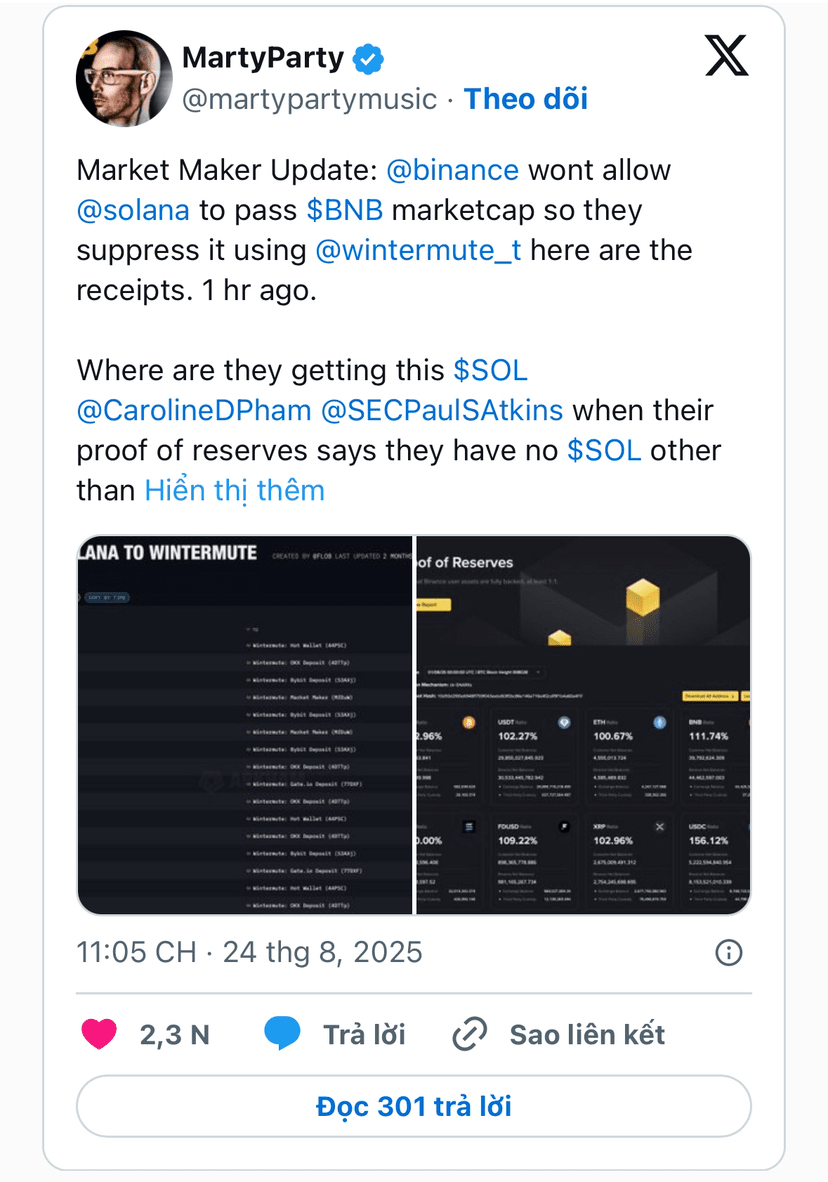New allegations have emerged suggesting that Binance is intentionally restricting Solana's growth to protect BNB's position, igniting fierce debate within the crypto community.
The origin began when analyst Marty Party on X claimed that Binance was collaborating with market maker Wintermute to prevent Solana's market cap from surpassing BNB. He announced some 'evidence,' while questioning where Binance sourced its SOL for trading activities, as the proof of reserves (PoR) indicated that the exchange did not hold Solana beyond customer deposits.

At the time of writing, Solana is trading at $205, with a market cap of $110 billion, only behind BNB at $876 and a market cap of $122 billion. Binance's PoR report shows that the exchange holds only 22.433 million SOL (corresponding to customer deposit balances), of which 22.013 million SOL are on the exchange's wallet and 420.35 SOL belong to third-party custody.
Notably, this is not the first time Binance and Wintermute have been suspected of market manipulation. Five months ago, reports surfaced that Wintermute was involved in organized sell-offs, causing many small tokens like ACT to plummet, with Binance alleged to be involved. Seven months prior, Binance was also scrutinized for $20 million transactions related to Wintermute.
These allegations raise concerns about the transparency of the relationship between centralized exchanges and market makers. Many experts warn that if Binance is indeed using Wintermute to regulate liquidity flows and stifle Solana, this would represent a serious conflict of interest, undermining trust in the PoR mechanism and market fairness.
Alan Knitowski, founder and former CEO of NASDAQ-listed companies like Cisco Systems and Phunware Inc., expressed outrage:
“So this 'new' system is worse than the old one? Why are we accepting such a fragile, manipulable mechanism? When will Binance be forced to shut down? Let’s arrest them. Prosecute them.”
These statements reflect the disappointment of the traditional finance (TradFi) sector as expectations that blockchain would bring greater transparency than the old system are continuously undermined by allegations of manipulation.
The allegations arise amid Solana's strong growth in the DeFi, NFT, and memecoin sectors, becoming a potential rival to Ethereum in scalability and even directly competing with BNB.
Although the claims have not been verified, the incident shows that trust in the cryptocurrency market remains fragile. On one side, the Solana community sees an ecosystem nearing mainstream adoption; on the other side, many believe that the 'big players' are erecting barriers to maintain their monopoly.
This raises a big question for regulators, investors, and developers: Should centralized exchanges still hold such significant power in the future?
If these allegations are verified, the US could very well launch an antitrust investigation over claims of unfair competition. This situation recalls the case of Google being investigated and heavily fined for favoring its Chrome browser, limiting competitors' opportunities. If a similar scenario occurs with Binance, it would certainly be bad news for investors holding BNB.

